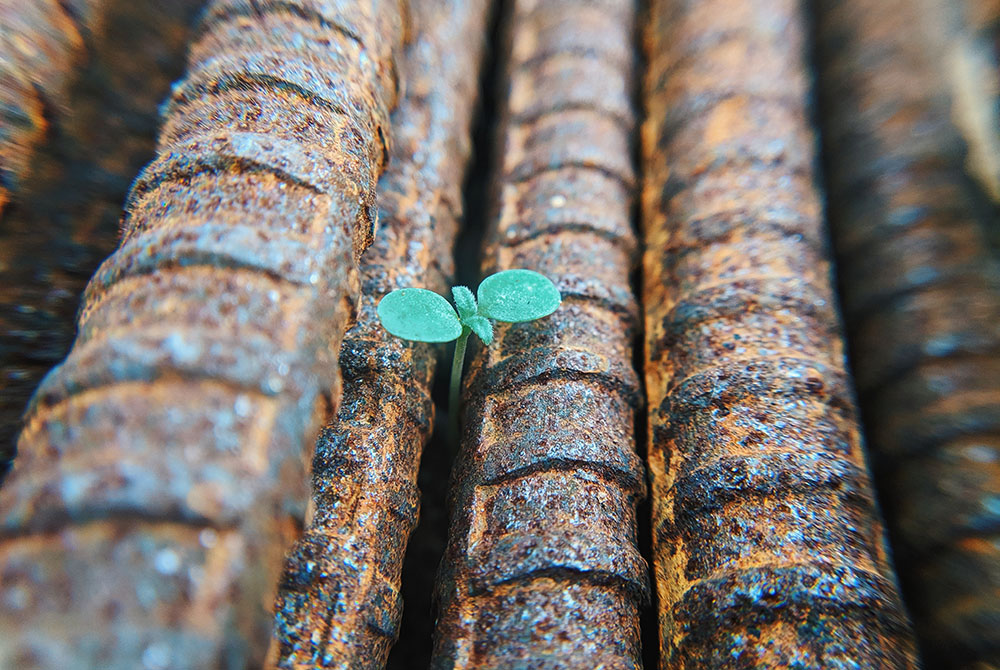
(Unsplash/Faris Mohammed)
I've been catching myself singing and there's a surprising theme to the songs.
Considering the state of things, there's a lot of reasons why silence might make more sense, why a somber state might be more appropriate than song. In recent weeks, the COVID-19 crisis has become so deadly that morgues cannot keep up. It remains uncertain whether there will be a smooth transition of political power after the recent election in the United States. Every day, my heart is heavy with grief and concern, as I pray for someone else who is experiencing homelessness or is unemployed, imprisoned, sick, dying or now deceased. Plus, I continue to be challenged by the ongoing need for reconstruction, for the building of a society not based on the evils of systemic racism and environmental degradation; it's big, overdue work.
I feel helpless and lost, I am not sure how to help. It's a lot, and I am discouraged and overwhelmed.
Yet, I am singing. When I am out on walks and washing the dishes, I am humming. When I pause in prayer, lyrics come to the front of my mind. It took me a while to notice that the songs had something in common, but now I know: I am singing Advent songs.
Advent is not insensitive to the realities of hardships and suffering. The hope of Advent simply insists that God's goodness gives us the equipment needed for the ongoing struggle.
It's technically offseason, I know, but Advent music makes complete sense. The sacred season of Advent acknowledges the darkness and suffering. It is a season of naming our longings, a time to lean more deeply into our trust in God, into the promises of our faith. God knows about hardship. God has helped humanity through hard times before. Advent is all about remembering, groaning and naming our dreams.
Most importantly Advent is about hope — fierce hope. It's a joyful counting-down-the-days hope; it's party preparation and excited anticipation. We know that God's goodness always gets to have the last word, so we get ready to celebrate. Like Easter, Advent expresses total confidence in God's goodness based on experience. And yet Advent is not insensitive to the realities of hardships and suffering. The hope of Advent simply insists that God's goodness gives us the equipment needed for the ongoing struggle. Christian hope is powerful.
Still, hope may be the hardest Christian virtue to cultivate, especially during hard times. The other day I spoke to a friend on the phone. She was heartsick and crying, discouraged and overwhelmed because of the pandemic. She admitted it was really hard for her to feel hopeful, that she wasn't sure she had any hope. She also told me that she hasn't heard anyone talking about hope, that she hasn't read anything about how to have hope.
I was surprised, because in my circles, hope seems to be thick. A few weeks ago I attended a virtual fundraiser called Keep Hope Alive . The theme of the recent National Religious Vocation Conference convocation was "2020 Vision: Focus on Hope." In my own prayer life, I have felt an emergence of refreshed hope and imagination arrive, along with a tender excitement; I am often wondering what good things God is doing, much more than I am grieving or scared.
On the other hand, it makes complete sense that hopeful conversation and energy is abundant in my circles: I am a Franciscan Sister, a Catholic sister, a woman religious. Those of us who have professed the vows of consecrated celibacy, poverty and obedience proclaim hope by our lifestyle. We have chosen to be prophetic in our hope, to point out promise and realities beyond what everyone can see.
Our vows have formed us into countercultural disciples. Hope is the foundation and fuel of this life. As people of prayer and service, we willingly go into dire circumstances and insist that God's goodness will be triumphant — all situations have potential. It may seem foolish, but that's the point. The hope we have is for realities beyond what may be obvious to others. We don't give up on anyone or any situation. We insist that evil never gets to have the last word. Our actions, attitudes and prayer life anticipate the arrival of the reign of God.
When I was younger, hope was like a synonym for optimism, a cheery sentiment that became Pollyanna in the midst of hardship. Everything will be better! Upbeat attitudes became equated with a false notion that I was entitled to endless joy. This was the "Field of Dreams" mentality ("If you build it, he will come") that knew nothing about tough times or eternal truths. True hope, though, is totally different.
In her essay "Rediscovering Hope," Dominican Sr. Michaela Martinez expounds on how St. Thomas Aquinas defined hope in the Summa Theologica: "First, hope is triggered by a future good — a good not yet obtained. Second, by a possible good — a good that can be obtained. Third, by a difficult good — a good that, while possible, can only be obtained through difficulty."
In other words, hope needs difficulties to exist, to be pointed toward the future. In each hard moment, the struggle is the energy of hope.
Advertisement
Speaking of the present moment, for contemplative Christians there is a tension between the ever-constant and all-holy now and the promise of the future. Hope is the bridge in this tension. The prophetic hope of our vocation is the stuff of heaven: hope is the energy of now and not yet. In prayer and discipleship, hope hallows the heartache and activates a sacred imagination. We're here and it is hard but it is holy, and we are heading somewhere mysterious and it is holy too.
Yet, we are faced with a dilemma, a challenge: How do we proclaim hope to those who are plagued by fear, grief and discouragement? What message do we have for people like my friend, crying on the phone, and feeling hopeless?
I wonder if there's a way we can groan in the hardship while we point to the goodness of God, to the promises of eternity. I am not exactly sure how, but I think Advent songs might help.
[Sr. Julia Walsh, Franciscan Sister of Perpetual Adoration, is a retreat director, speaker, educator, activist and award-winning writer who blogs at MessyJesusBusiness.com. Follow her on Twitter: @juliafspa.]







